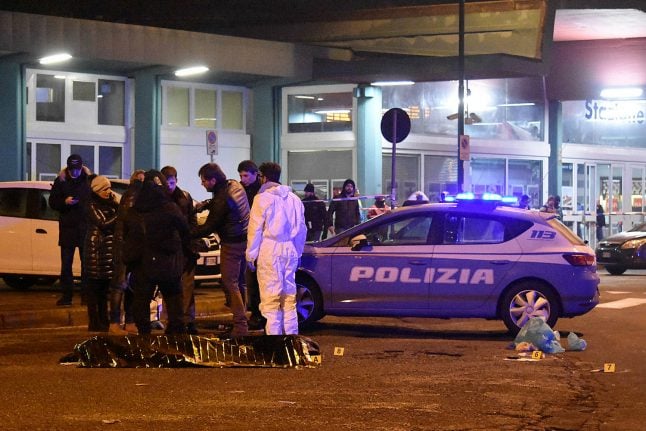BERLIN
What was the Berlin attack suspect doing in Milan?
Nobody comes to Sesto San Giovanni by chance, say the residents of the dreary working-class Milan suburb where police caught up with Berlin market attack suspect Anis Amri.
Published: 24 December 2016 11:37 CET

Police and forensics experts gather around the body of suspected Berlin truck attacker Anis Amri after he was shot dead in Milan on December 23. Photo: Daniele Bennati/AFP
So why, Italy wonders, did Europe's most wanted man end up here?
Amri, a 24-year-old Tunisian, was shot dead by police on Friday during a routine check at the local train station, after opening fire first.
Sesto San Giovanni, with its 80,000 inhabitants, is where Amri caught the officers' attention in the small hours. It's a hub for transport, the last stop on a metro line, and has a busy bus terminal where buses leave for Spain, Morocco, Albania and southern Italy.
Many foreigners come through here, and police controls are particularly thorough.
“I get checked by police every day getting off the bus,” said Aziz, a young Moroccan worker.
“At night this place is deserted, which would explain why somebody alone here would be immediately spotted by a police patrol,” he told AFP.
According to Italian daily La Stampa, police believe that Amri arrived in Italy by train from Chambery, southeastern France.
They think he stopped for three hours in Turin, where police are now checking video surveillance footage for clues as to any contact with accomplices.
But none of the images they have seen so far show him using a phone, and according to Milan police chief Antonio De Iesu, he did not have one with him when he was shot dead.
He then travelled to Milan, where he arrived at 1 am Friday, before going on to Sesto San Giovanni.
Was he hoping to hook up with members of a network? Was he looking for new ID to get him out of Europe? Or was he planning some kind of revenge against Italy, where he spent four years in prison for torching a school in 2011?
Police are short on answers. But they do point out, according to Italian media, that Sesto San Giovanni, once known as “Italy's Stalingrad” because of the powerful local Communist party, has become a multicultural town with a large Muslim community.
Police chief De Iesu told journalists that Amri had “no links with the Sesto mosque”, but some locals wonder if he had contacts nearby.
“Some people are worried,” said Tommaso Trivolo, who lives in a high-rise building opposite the train station from where he saw the ambulances arriving with screaming sirens just after the shooting.
Italy does its bit investigating jihadist sympathiser networks, but only a few dozen Italians have actually gone off to join Islamic State fighters in Iraq or Syria.
And despite the occasional threatening militant video, Italy has never been the target of any jihadist attack.
Still, many Italians are startled that the man tracked by the combined power of the continent's police forces could slip into their country unnoticed.
“He could have committed more attacks,” acknowledged De Iesu, calling Amri “a very dangerous fugitive”.
Populists have seized the opportunity to further their agenda, including Beppo Grillo, head of the Five Star Movement.
“Italy is becoming a crossroads for terrorists. We can't detect or identify them, and thanks to Schengen they can cross borders without trouble,” he said on his blog, referring to the EU's passport-free travel system.
Many other Italians declare themselves to be fatalistic, like Francesco Micali, another resident of Sesto San Giovanni.
“There could easily be an attack in Italy, just like in France, Germany and Spain,” said.
As for the two policeman who stopped the suspect, who are being celebrated as heroes in Italy: “They just got lucky,” said Micali.
Url copied to clipboard!


 Please whitelist us to continue reading.
Please whitelist us to continue reading.